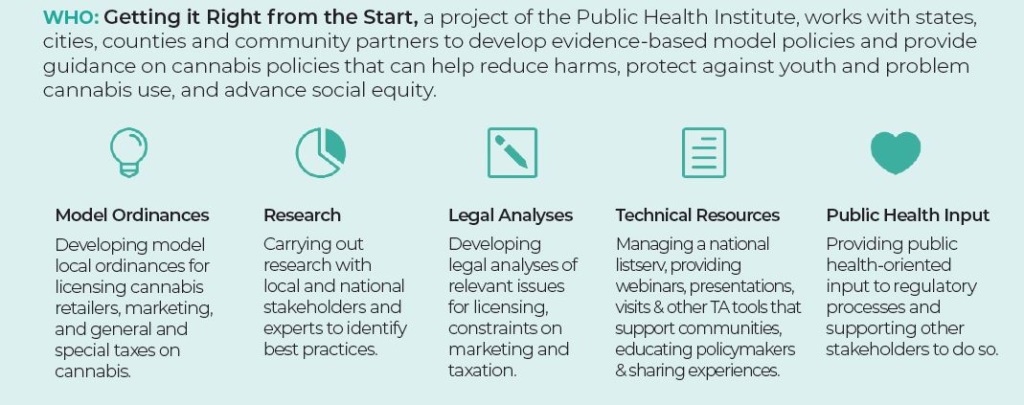
The State of Local Cannabis Policy in California Cities and Counties: 2024 Scorecards

The legal cannabis market in California has grown enormously. What are communities doing to protect youth, public health and equity? These scorecards, produced by PHI’s Getting it Right from the Start, evaluate the policies passed by California cities and counties that allow cannabis sales, rating them on a 100-point scale.
The Scorecards highlight jurisdictions that are making positive steps in adopting cannabis regulations that protect youth, public health and equity—and demonstrate the gaps in protections in many other localities. This provides policymakers, health advocates and others the only comprehensive guide to understanding and comparing the policies and trends on cannabis regulations throughout the state.
Explore the Scorecards
Learn more: Review the scoring methodology; see best practices in action, explore scores by region; or view the full press kit and fact sheet.
Fall 2024 Updates
The 2024 scorecards assess jurisdictions on a 100-point scale, with higher scores representing stronger public health measures enacted over the past five years. Evaluations are based on six categories: retailer requirements, taxation, products, marketing, smoke-free air, and equity measures. The City of Pomona topped this year’s scorecard with a record-breaking 60 points, driven by innovative policies such as pre-reviewing marketing materials to prevent youth appeal, supporting equity applicants, educating consumers with health information, and allocating funds to youth programs. The City of Fresno ranked second with 54 points, excelling in maintaining smoke-free air, reserving licenses for equity applicants, and minimizing youth exposure to storefronts and marketing. Despite these achievements, the statewide average score remains low—22 out of 100 points for jurisdictions allowing storefront sales and just 12 points for those permitting delivery only. The scorecards also show that fully 67% of Californians are now living in areas where legal cannabis is available, up from 55% in 2019. See more highlights:
- Retail Location Limits: 78% (stable) of jurisdictions permitting storefront retailers set a limit on the number of licenses they would issue. 31% (down 1%) required retailers to maintain a greater distance from schools than state law mandates. But the store to people ratio fell to 1:17,000 in 2023 vs. 1:21,000 in 2019.
- Local Cannabis Taxes: 177 jurisdictions collect local cannabis taxes, an increase of 46% since 2018. However, only 25 jurisdictions dedicate revenue to community reinvestment, prevention efforts, or youth programs.
- Smoke-Free Policies: A growing proportion of jurisdictions keep storefronts smoke-free (139, 67%), and a growing number (85) prohibit temporary events in public spaces. However, 49 jurisdictions now allow on-site consumption, raising concerns about a return to “smoke-filled rooms” and worker health. The passage of the Cannabis Cafe bill this year heightens the urgency for local jurisdictions to act decisively to keep air smoke-free.
- Equity Initiatives: Although still limited, 38 jurisdictions enacted equity policies for hiring or licensing, an increase from six jurisdictions in 2019.

Model Policies for Local Governments
To assist local governments, Getting it Right from the Start offers model policies for cannabis retailing, marketing and taxation that cities and counties can adopt. They also offer complementary resources and expert technical assistance to state and local regulatory agencies, policymakers and their staff, as well as community organizations and advocates.
See previous scorecards
The 2023 Scorecards revealed that only 10 of 539 localities enacted any cannabis product restrictions—illustrating the enormous space for local action. See the 2023 Scorecards.
Originally published by Getting it Right from the Start
Work With Us
You change the world. We do the rest. Explore fiscal sponsorship at PHI.
Support Us
Together, we can accelerate our response to public health’s most critical issues.
Find Employment
Begin your career at the Public Health Institute.



